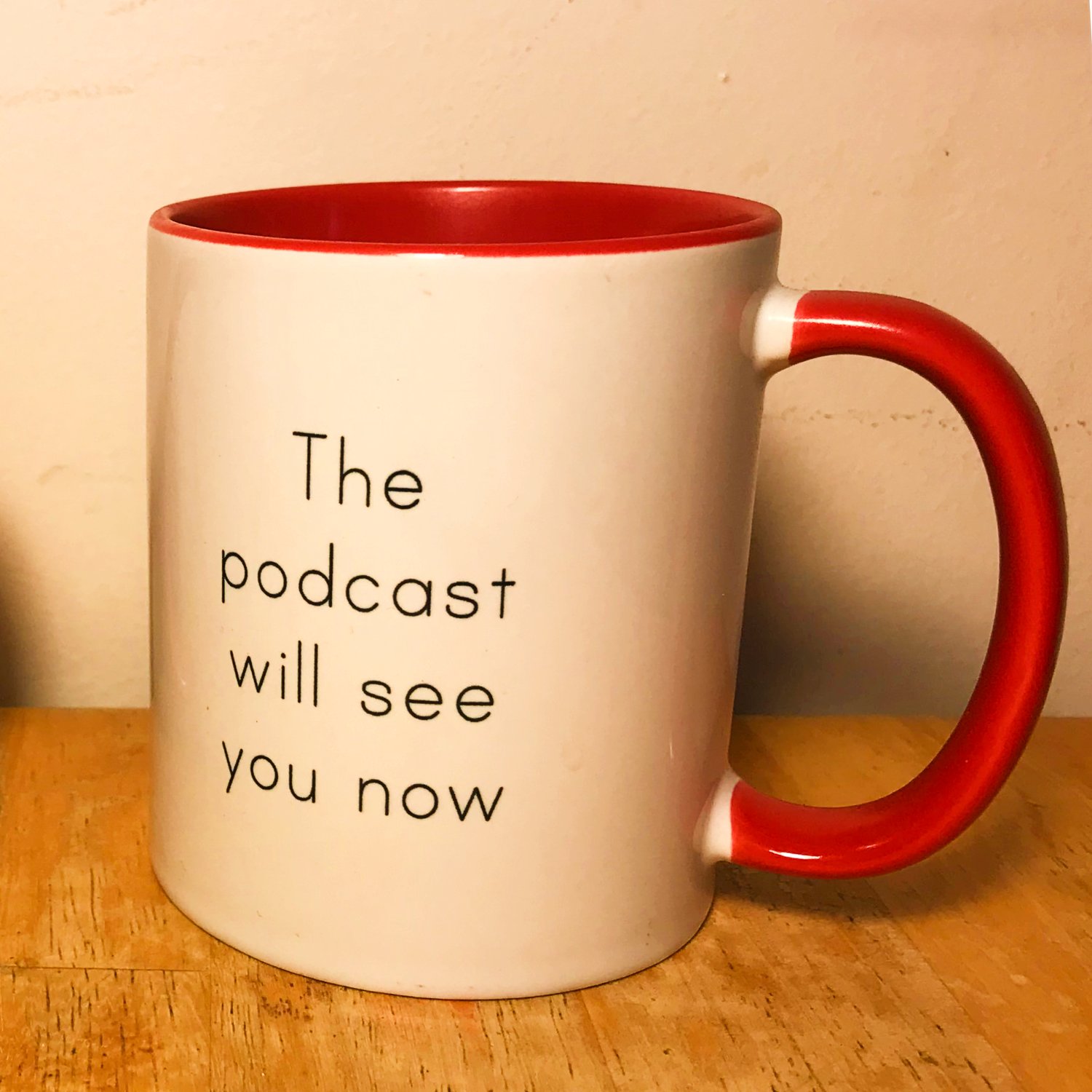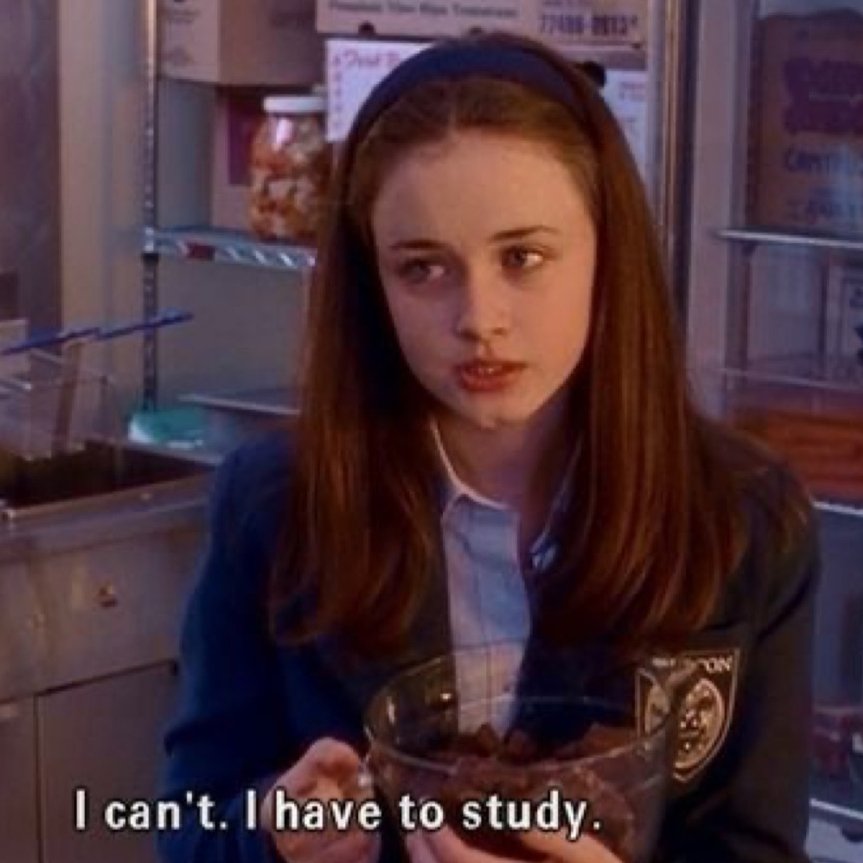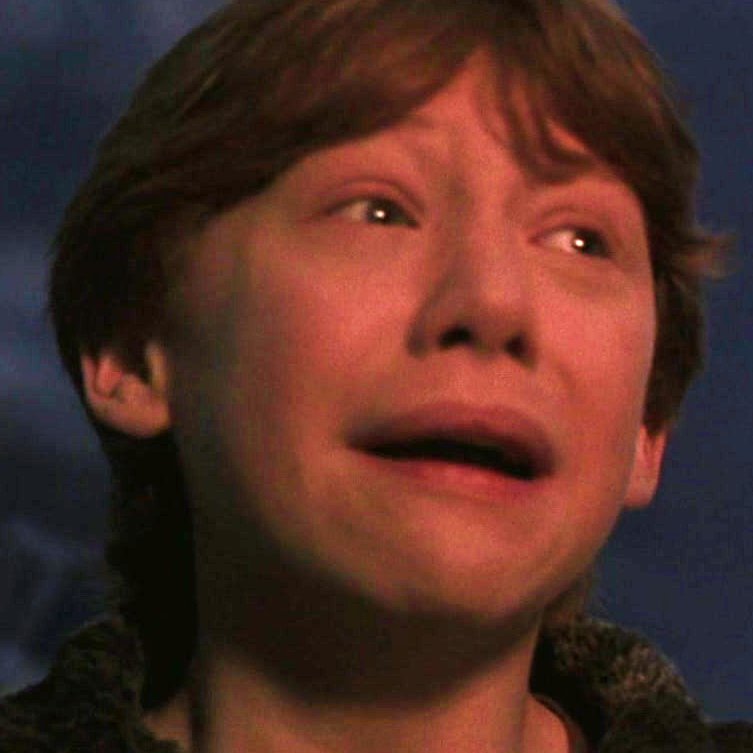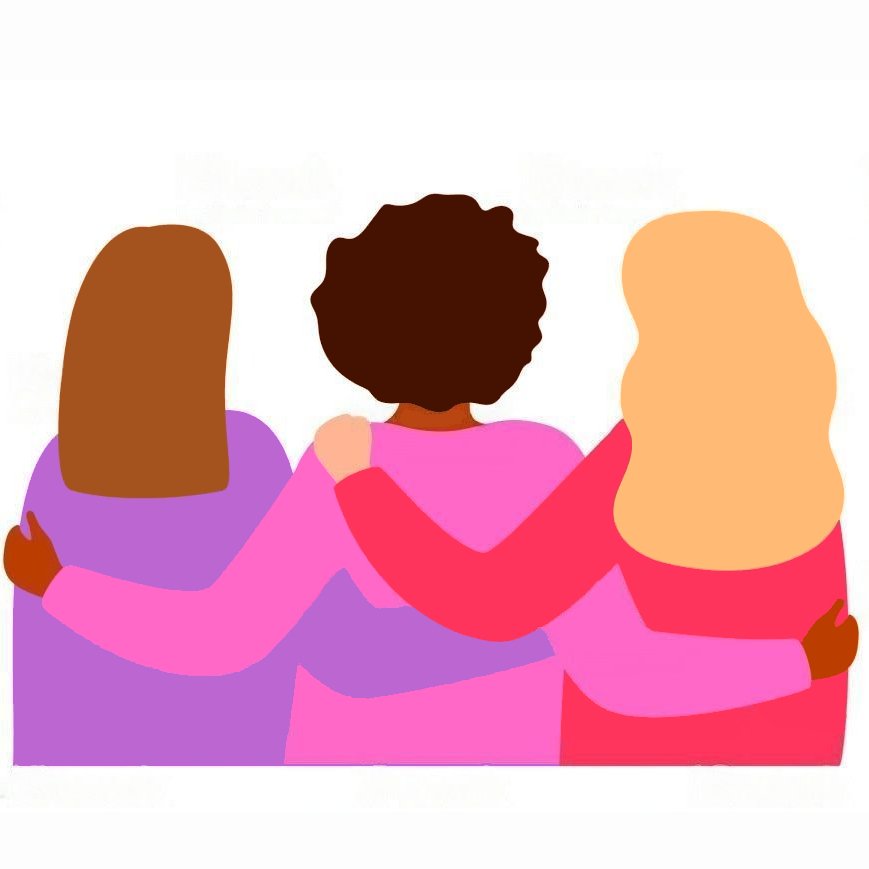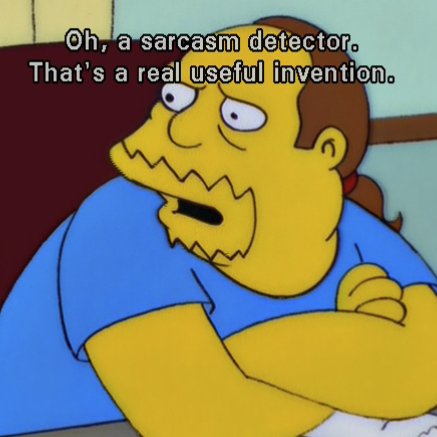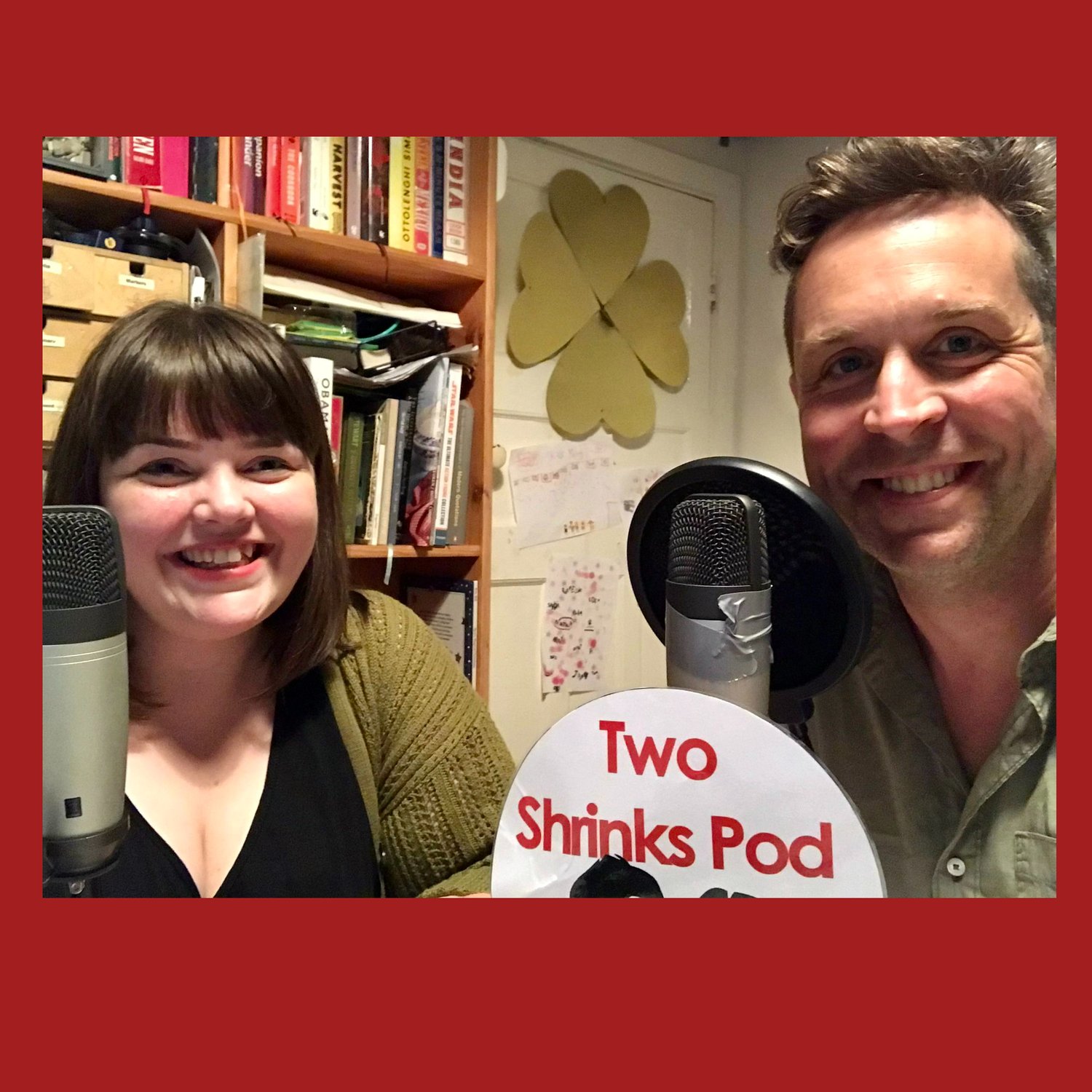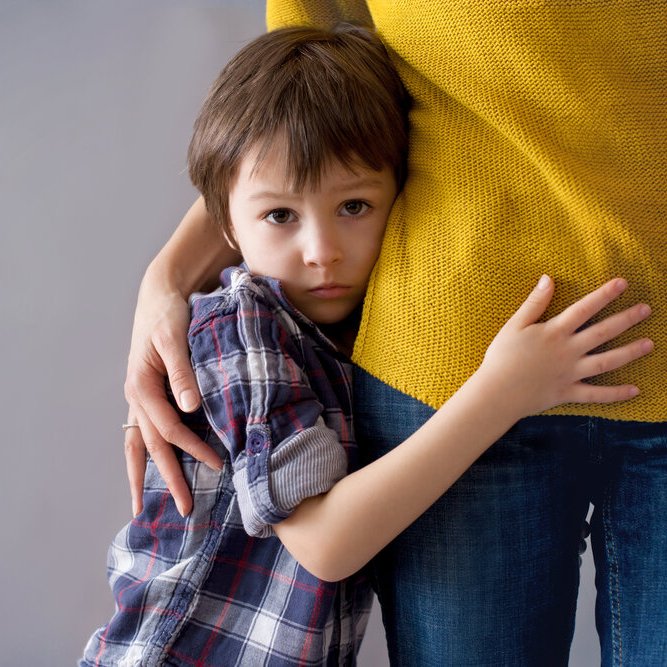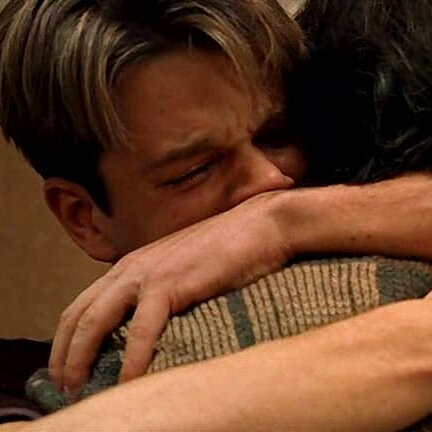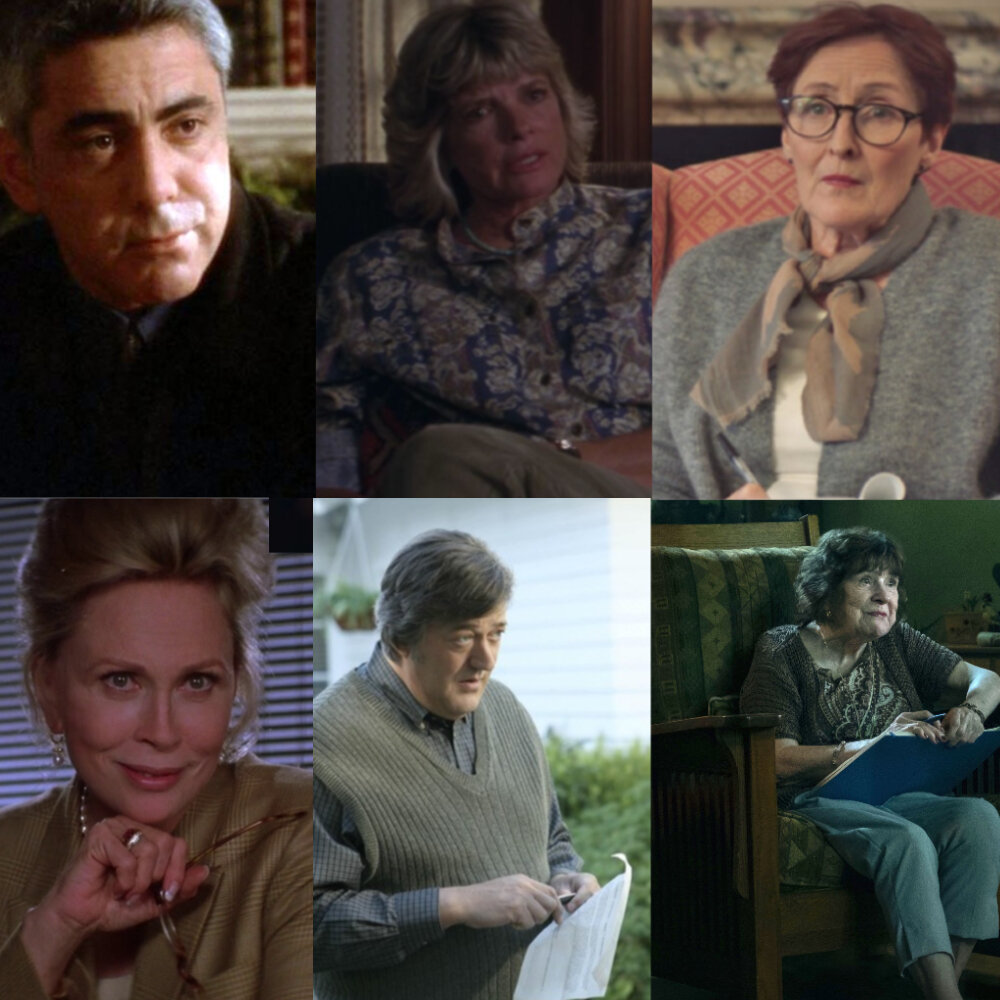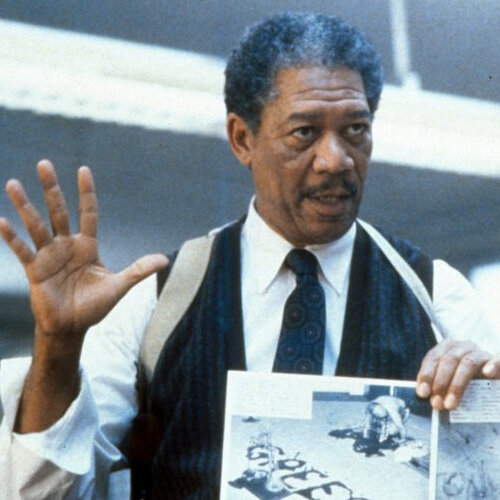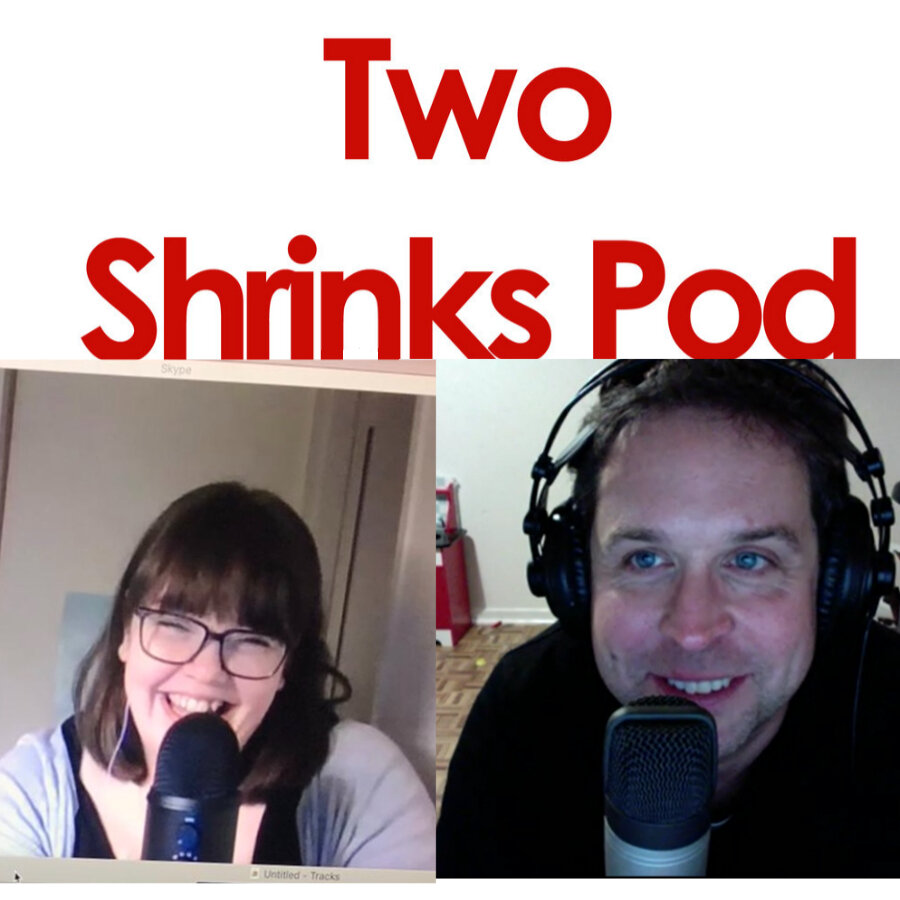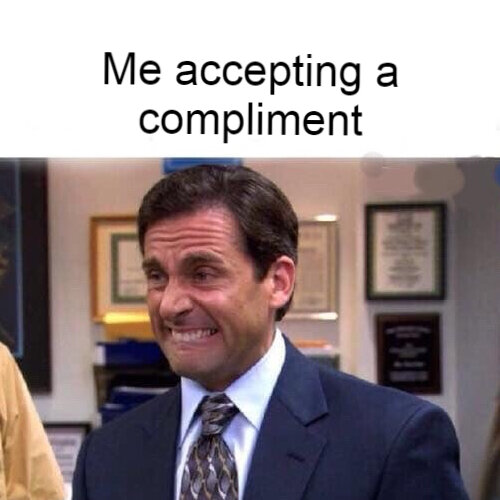Discover Two Shrinks Pod
Two Shrinks Pod

Two Shrinks Pod
Author: Dr Hunter Mulcare & Amy Donaldson
Subscribed: 334Played: 9,374Subscribe
Share
Description
Australian psychologists Amy & Hunter nerd out about all things psychology, from Star Wars to Social Anxiety.
Listen in for an independent pod with great chemistry between therapists working in oncology (Hunter) & child psychology (Amy). Each episode focuses on a psychological issue, therapy or simply provides an outlet to overanalyse our favourite tv & film characters.
@twoshrinkspod
91 Episodes
Reverse
We have decided to call time on Two Shrinks Pod as our personal and professional lives have prevented us from being able to regularly produce the show. As we both care about the quality of the work we put out, we decided that if we couldn’t produce something we were proud of then it was time to end the pod.
Thank you to all of the tens of thousands of listeners who had let us into your ears and minds, and for sharing our nerdy sense of humour. Thanks to our collaborators and interview guests. It has been an amazing journey to go on with all of you.We will keep our episodes and website up indefinitely. If you want to contact us, we will keep monitoring our email twoshrinkspod@gmail.com and our twitter @twoshrinkspod until the end of May 2023. Irvin Yalom said “life is a spark between two identical voids, the darkness before birth and the one after death”.Listeners, thanks for making our spark burn that just that bit brighter. We hope yours burned brighter too for having listened to us.Amy and Hunter.
If you’re a student struggling to cope with exams or a parent supporting one, this episode is for you. Just in time for the year 12 exams, we’ve prepared a crash course on how to cope with anxiety in the lead up, on the morning of and during an exam. Listen for practical tips, how to know when to take a break and ways you can calm down once your in your exam.
In this episode we cover how to cope:During study periodsThe night before/morning of an examDuring the examAfterwards if you have another exam This episode of Two Shrinks Pod was sponsored by Calabash.Visit https://calabash.courses/twoshrinkspod to access a free talk
Head over to the School of Movies Podcast to listen to Amy and Hunter talk about the comedy mob film Analyze This starring Robert De Niro and Billy Crystal. We talk about anxiety attacks, toxic masculinity, doing therapy at gun point and the ethical issues of receiving gifts from your mobster client. School of Movies Analyze This : https://www.podbean.com/ew/pb-jbcwc-12d7d2bSchool of Movies is a British podcast hosted by Alex and Sharon Shaw who dissect and discuss modern cinema, there is no movie podcast like it and it is well worth a listen. 2SP has previously been on their show discussing Inside Out: https://www.podbean.com/ew/pb-44rqh-b61ed2Zombieland: https://www.podbean.com/ew/pb-66pz9-c3c60fand Mary and Max: https://www.podbean.com/ew/pb-mqs5i-eb20efSharon was also a guest on 2SP in last year’s instalment of Shrinks on Film : https://podcasts.apple.com/au/podcast/71-psychs-on-film-3-shrinks-with-a-vengeance/id1236774684?i=1000526171601
This episode we’ve put together a crash course on phobias. We know phobias are on the VCE psychology exam and we have covered the main topics and theories covered in the course. The episode is pitched at Australian year 12 psychology students (and for their parents wanting to understand what this psychology garbage is). We don’t assume any prior psychology knowledge so this means that it is good episode for anyone who want to understand about psychological theory and treatment. Understanding phobias and their treatment brings together a lot of core psychological concepts. Listen in for easy to understand definitions, examples and how it all fits together to understand the case of Ron Weasley’s arachnophobia.
We can’t promise we have talked about everything on the exam but it should be a good way to brush up pre exam. Looking for something specific?01:20 Definitions13:50 Prevalence16:20 The 4 P’s & the biopsychosocial model: A case study of Ron Weasley25:00 Classical conditioning37:00 Operant conditioning48:00 GABA dysfunction51:10 Stress response system55:45 Cognitive biases1:01:30 Triggers1:04:00 Transtheoretical model of change1:09:00 TreatmentIf you liked the episode please rate/review us or tell someone about the show. You can access your free Calabash talk at https://calabash.courses/twoshrinkspod
For episode 81 we’re taking a comprehensive, research driven look at abortion: what it’s like making the decision, how it impacts people psychologically and what happens if you can’t have one when you want to? Join us for a discussion of what the research actually says, in all it’s complexity, about how women respond after an abortion.To skip forward to a particular topic:05:30 Decision making19:35 Psychological impacts of having a voluntary abortion40:25 Impacts on sexual functioning44:45 Psychological impacts of having an abortion for medical reasons49:12 Outcomes for women who want an abortion but are denied one
This week’s episode was brought to you by Calabash. Access your free talk at:https://calabash.courses/psych-company/
Research (in order of discussion):Introduction:APA Taskforce on Mental Health and Abortion (2008) https://www.apa.org/pi/women/programs/abortion/mental-health.pdf Abortion definition (2019) https://www.bmj.com/company/newsroom/nine-out-of-10-abortions-done-before-12-weeks-in-many-high-income-countries/ Australian abortion rates (2021) https://www.mja.com.au/journal/2021/215/8/estimating-abortion-rate-australia-national-hospital-morbidity-and Decision making:Bracken & Kasl (1975) Delay in seeking induced abortion: a review and theoretical analysishttps://doi.org/10.1016/0002-9378(75)90929-1 Miller (1992) An empirical study of psychological antecedents and consequences of induced abortionhttps://doi.org/10.1111/j.1540-4560.1992.tb00898.x Allanson (2007) Abortion decision and ambivalence: Insights via an abortion decision balance sheethttps://www.tandfonline.com/doi/abs/10.1080/13284200701675767 Pereira, Pires & Canavarro (2019) Decision-making trajectories leading to termination of an unplanned pregnancy: specificities among adolescent and adult women https://doi.org/10.1080/02646838.2019.1566596 Leithner et al (2021) Three or less? Decision making for or against selective reduction and psychological outcome in forty women with a triplet pregnancyhttps://doi.org/10.1080/0167482X.2020.1750005 Psychological responses following a voluntary abortion:Steinberg et al (2016) Psychosocial factors and pre-abortion psychological health: the significance of stigma https://doi.org/10.1016/j.socscimed.2015.12.007 Horvath & Schreiber (2017) Unintended pregnancy, induced abortion, and mental healthhttps://doi.org/10.1007/s11920-017-0832-4 Rocca et al (2013) Women’s emotions one week after receiving or being denied an abortion in the United States https://pubmed.ncbi.nlm.nih.gov/24020773/O’Donnell, O’Carroll and Toole (2018) Internalized stigma and stigma-related isolation predict women’s psychological distress and physical health symptoms post-abortion https://doi.org/10.1177%2F0361684317748937 Foster et al (2015) A comparison of depression and anxiety symptom trajectories between women who had an abortion and women denied onehttps://pubmed.ncbi.nlm.nih.gov/25628123/Toffol et al (2016) Anxiety and quality of life after first-trimester termination of pregnancy: a prospective study https://doi.org/10.1111/aogs.12959 Van Ditzhuijzen et al (2018) Long-term incidence and recurrence of common mental disorders after abortion. A Dutch prospective cohort studyhttps://doi.org/10.1016/j.jpsychires.2018.04.001 Biggs et al (2017) Women’s mental health and well-being 5 years after receiving or being denied an abortion: a prospective, longitudinal cohort studyhttps://pubmed.ncbi.nlm.nih.gov/27973641/ Biggs et al (2018) Five-year suicidal ideation trajectories among women receiving or being denied an abortionhttps://pubmed.ncbi.nlm.nih.gov/27973641/ Holmlund et al (2014) Psychological ill-being experienced by first-time mothers and their partners in pregnancy after abortion: a cohort studyhttps://pubmed.ncbi.nlm.nih.gov/27973641/ Sexual functioning:Limoncin et al (2017) The effect of voluntary termination of pregnancy on female sexual and emotional well-being in different age groupshttps://doi.org/10.1080/0167482X.2017.1285901 Psychological responses after an abortion for medical reasons:Nazare, Fonesca & Canavarro (2013) Adaptive and maladaptive grief responses following TOPFA: actor and partner effects of coping strategieshttps://doi.org/10.1080/02646838.2013.806789 Nazare, Fonesca & Canavarro (2013) Trauma following termination of pregnancy for fetal abnormality: is this the path from guilt to grief?https://doi.org/10.1080/15325024.2012.743335 Lafarge, Mitchell & Fox (2017) Posttraumatic growth following pregnancy termination for fetal abnormality: the predictive role of coping strategies and perinatal grief https://doi.org/10.1080/15325024.2012.743335 Outcomes for women who want an abortion and can’t have one:Rocca et al (2013) Women’s emotions one week after receiving or being denied an abortion in the United Stateshttps://doi.org/10.1363/4512213 Horvath & Schreiber (2017) Unintended pregnancy, induced abortion, and mental healthhttps://doi.org/10.1007/s11920-017-0832-4 The harms of denying a woman a wanted abortion: findings from the turnaway studyhttps://www.ansirh.org/sites/default/files/publications/files/the_harms_of_denying_a_woman_a_wanted_abortion_4-16-2020.pdf Ludermir et al (2010) Common mental disorders in late pregnancy in women who wanted or attempted an abortionhttps://doi.org/10.1017/s003329170999184x Herd et al (2015) The implications of unintended pregnancies for mental health in later life https://ajph.aphapublications.org/doi/10.2105/AJPH.2015.302973 Concluding remarks:Rebuttal to Coleman’s paper https://www.ncbi.nlm.nih.gov/pmc/articles/PMC3699180/ Rebuttal to Reardon’s work https://www.bmj.com/rapid-response/2011/10/31/reardon-response-russo-and-schmeige-misleads-omission-and-commission Quote from Surgeon General C Everett Koop https://www.apa.org/pi/women/programs/abortion/mental-health.pdf The following resources supported our understanding of abortion legislation and access but were not cited in the show:Upadhyay et al (2021) Barriers to abortion care & incidence of attempted self-managed abortion https://www.contraceptionjournal.org/article/S0010-7824(21)00385-1/fulltext de Londras et al (2022) The impact of provider restrictions on abortion-related outcomeshttps://doi.org/10.1186/s12978-022-01405-x Faundes & Shah (2015) Evidence supporting broader access to safe legal abortionhttp://dx.doi.org/10.1016/j.ijgo.2015.03.018 Reingold & Gostin (2019) State abortion restrictions and the new supreme courthttps://pubmed.ncbi.nlm.nih.gov/31166573/ Pierson (2022) Roe v Wade overturned: what abortion access and reproductive rights look like around the worldhttps://theconversation.com/roe-v-wade-overturned-what-abortion-access-and-reproductive-rights-look-like-around-the-world-184013
This episode we’re covering our professional gripes with a thin veil of science and talking about work research. Join us for a light-hearted, research based whinge about frictionless spaces for nomadic workers (or hotdesking), how meetings interrupt us, documentation makes us burnt out and just how judgemental we all are about email signatures. To wrap up, Hunter proves a point about windfarms to a random farmer he met on a plane and Amy waxes lyrical about comfort food.
Work Research:The demands and resources arising from shared office spacesSettlers, vagrants and mutual indifference: unintended consequences of hot-deskingMeetings and more meetings: the relationship between meeting load and the daily well-being of employeesThe impact of time spent on the electronic health record after work and of clerical work on burnout among clinical facultyHow Impactful Is Presentation in Email? The Effect of Avatars and SignaturesTWCA:The Pattern of Complaints about Australian Wind Farms Does Not Match the Establishment and Distribution of Turbines: Support for the Psychogenic, ‘Communicated Disease’ HypothesisExploring comfort food preferences across age and gender
This time on 2SP we’re taking a look at sarcasm through 4 research articles. How does it develop in childhood? Are some cultures really more sarcastic? Can make us more creative? And, can emojis help avoid awkward misunderstandings of sarcasm when we text? After a delightful break with some sparkling shiraz, Hunter laments the impact of clutter on productivity and Amy talks about whether people feel more safely attached to their pets or their partners. Sarcasm ResearchThe highest form of intelligence: Sarcasm increases creativity for both expressers and recipients (Huang et al, 2015)Saying what you don’t mean: a cross-cultural study of perceptions of sarcasm (Blasko et al, 2021)Emoji as a tool to aid the comprehension of written sarcasm: evidence from younger and older adults (Garcia et al, 2022)Development of children’s ability to distinguish sarcasm and verbal irony (Glenwright & Pexman, 2010)TWCARomantic partners and four-legged friends: an extension of attachment theory to relationships with pets (Beck & Madresh, 2015)The impact of office clutter on remote working: “I can’t work with all this stuff!” (Ferrari et al, 2021)
Struggling to get anything done? Constantly torturing yourself over what you could’ve achieved if only you had a routine, stuck to a schedule, magically became a more productive, focused person? You’re not alone.Join us for a chat with Madeleine Dore: Melbourne journalist, interviewer and creator of the Everyday Routines project.. She takes us through how to approach our days creatively, why we get stuck and how even the most prolific creatives battle with their routines.Want to hear more from Madeleine? We loved her book, I Didn’t Do the Thing Today: On Letting Go of Productivity Guilt:https://www.murdochbooks.com.au/browse/books/other-books/I-Didnt-Do-The-Thing-Today-Madeleine-Dore-9781922351500 You can find her interviews, podcast & other work at:https://extraordinaryroutines.com/ Her instagram is: @extraordinary_routines
For our last episode of the year we’re looking back over 2021. We chat about the episodes of the year with a dash of new research, a new therapy portrayal in Mare of Easttown and a nostalgic look at our favourite episodes. To really get things off our chests, we wrap up with the Gripe List - a random assortment of things that have pissed us off in 2021. As always, thank you for listening. We’ll be back at the start of 2022
This episode we’re giving a crash-course for parents on how to help your child when they’re anxious. Amy talks us through what kids’ anxiety looks like, how to begin to calm things down and when to call in the experts. Listen for practical, doable tips on what to do when your kid’s anxiety is overwhelming them or you. To finish up, Hunter talks about and Amy is inspired by Twitter to talk through drop bear survival.
Parent resources:Best bubble solution with a wand that’s attached to the lid: https://www.bigw.com.au/product/ultra-premium-amazing-bubbles-6-pack/p/789862 Books: The Whole Brained Child, Parenting from the Inside OutAustralian parenting programs: Tuning in to Kids, Bringing up Great KidsACF free parenting booklets: Connected Parenting, Mindful ParentingA book for kids about anxiety & what’s happening in their brain: Hey, WarriorThings we came across:Holiday spendingDrop bear tracking
We know how much healthcare workers have been through, are still going through. So for this episode, we wanted to help doctors, nurses and allied health clinicians deal with burn out and when it’s all too much. Join us to hear Hunter talk through how you know when you’re becoming burnt out and what can you do to deal with patients who push your buttons.Because we’re creatures of habit, we finish with things we came across - Amy talks about why kids stick out their tongues to concentrate and Hunter examines the jealousy of dogs. TWCA:Jealousy of dogsKids’ tongue out concentration
It is late October 2021, Melbourne is emerging from a 77 day lockdown and we’ve just earned the dubious title of most locked down city in the world. Throughout, this difficult situation has been made harder by constant media and political pressure to end lockdowns, often with the argument that lockdowns cause suicide.
We wanted to dig into this properly and find out from the data whether this actually was the case? In this episode we take a look at suicide statistics in four Western countries, talk through the factors that can lead to suicide and provide some tips for how to respond if you or someone you care about is feeling suicidal. Supports (for Australian listeners):If you are in immediate danger: 000For crisis support 24/7: Lifeline 13 11 14 or Suicide call back service (24 hour phone & online support): 1300 659 467or online www.suicidecallbackservice.org.au To access local crisis team support, call your state’s contact number: https://www.healthdirect.gov.au/crisis-management To access private psychologists: see a GP for a mental health care plan or contact local private practices. Your GP may know of local clinics with availability or shorter wait times. Research and data:Australian Institute of Health and Welfare data: https://www.aihw.gov.au/suicide-self-harm-monitoring/data/suspected-deaths-by-suicide/data-from-suicide-registers Victorian coroner’s court data: https://www.coronerscourt.vic.gov.au/sites/default/files/2021-01/Coroners%20Court%20Monthly%20Suicide%20Data%20Report%20-%20December%202020.pdf NZ coroner: https://coronialservices.justice.govt.nz/assets/Documents/Publications/Chief-Coroner-Suicide-Stats-2020-Media-Release.pdf NZ symptoms: https://pubmed.ncbi.nlm.nih.gov/34313158/ UK suicide rates: https://www.ons.gov.uk/releases/deathsfromsuicidethatoccurredinenglandandwalesbetweenaprilandjuly2020 US suicide minorities: https://pubmed.ncbi.nlm.nih.gov/33290944/ US suicide data: https://jamanetwork.com/journals/jamanetworkopen/fullarticle/2775359 America’s health rankings (data from all states): https://www.americashealthrankings.org/explore/annual/measure/Suicide/state/ALL?edition-year=2020
This week we’re returning to an everyday psychology topic and pondering why we laugh. In classic Two Shrinks style, we talk through four pieces of research: preschoolers laughing with their friends, personality and laughter, ridicule in family and funeral workers’ use of laughter.As always we finish up with things we came across: Amy freaks out about robot-human interaction and Hunter delights in a letter to the editor.Research:Social Facilitation of Laughter and Smiles in Preschool ChildrenDo extraverts ‘like to laugh’︁?: An analysis of the Situational Humor Response Questionnaire (SHRQ)An Initial Study on How Families Deal with Ridicule and Being Laughed at: Parenting Styles and Parent–Child Relations with Respect to Gelotophobia, Gelotophilia, and KatagelasticismI Nearly Died Laughing: Humor in Funeral Industry OperatorsTWCA:Robot Humor: How Self-irony and Schadenfreude Influence People's Rating of Robot LikabilityNarratives with Robots: The Impact of Interaction Context and Individual Differences on Story Recall and Emotional UnderstandingDevelopment and Testing of Psychological Conflict Resolution Strategies for Assertive Robots to Resolve Human–Robot Goal ConflictDesigning Social Interactions with a Humorous Robot PhotographerHunter’s book recommendation: In Moonland by Miles AllinsonLetter to the editor
We’re back after an unexpected break with a classic Two Shrinks question, why do we cry?Why is it that something painful, emotional or even joyful makes us tear up? How does it help us communicate, share with others, process how we feel? We’ll talk through why music makes us cry, what babies expect to happen when they cry, who cries in therapy and when it helps. To wrap up, we finish with the all important play behaviours of octopuses/octopi/octopodes and some research into whether little Albert actually became scared of white rabbits.Join us next time for an episode on laughter. If you need to take the time for a good cryve (cry while driving), let us set the mood we have a Cryving playlist up on Spotify. Songs to Cryve to (Spotify playlist) :https://open.spotify.com/playlist/2qBqylXVS9QddK5gDR1wwF?si=75bdb78ec9c74dcc Crying Research:Feeling Like Crying When Listening to Music: Exploring Musical and Contextual FeaturesYoung Infants Expect an Unfamiliar Adult to Comfort a Crying Baby: Evidence from a Standard Violation-of-Expectation Task and a Novel Infant-Triggered-Video TaskPatient Crying in Psychotherapy: Who Cries and Why?Patients’ Crying Experiences in Psychotherapy and Relationship with Working Alliance, Therapeutic Change and Attachment StylesWhen and for Whom does Crying Improve Mood? A Daily Diary Study of 1004 Crying EpisodesTWCA:When Do Octopuses Play? Effects of Repeated Testing, Object Type, Age, and Food Deprivation on Object Play in Octopus VulgarisDid Little Albert Actually Acquire a Conditioned Fear of Furry Animals? What the Film Evidence Tells usMusic featured in the episode:
Ave Maria - https://www.youtube.com/watch?v=r_5bYNqpEFU Beethoven’s 9th symphony - https://www.youtube.com/watch?v=hdWyYn0E4Ys Skinny love - Bon IverOn my own - Samantha BanksO children - Nick CaveIt’s quiet uptown from HamiltonSomeone great - LCD SoundsystemSomewhere over the rainbow - Israel Kamakawiwo’oleThanks to listeners for contributing their songs - the playlist above includes all of our favourites.
In honour of our third instalment of psychs on film, we’re following the trilogy format and introducing a new character, well actually a guest - Sharon Shaw, podcaster and therapist from the School of Movies podcast. Join us for a discussion of 6 film and tv therapists - what we love, how it’s different from real life therapy and issues we can’t stop ranting about. The shows we talk about are:
Top left - Right: West wing, donnie darko, fleabagBottom left - right: thomas crown affair, bones, Ozarks
The Thomas Crown Affair (1999)The Ozarks (2020). Season 3, episode 5. Clip: https://www.youtube.com/watch?v=xSWwltmJUEk The West Wing (2000). Season 2, episode 10Donnie Darko (2001). Clip: https://youtu.be/GPOjr_z3Wn4 Fleabag (2019). Season 2, episode 2. Clip: https://www.youtube.com/watch?v=Yy6kbVptkRY Bones (2007) Season 2, episode 13Listen to Sharon Shaw on the School of Movies podcast: https://schoolofmovies.podbean.com/
The Breakfast club - five teenagers in detention, each struggling and assuming everyone else has their life together. But what would happen if they were referred for therapy instead? Join us for a Two Shrinks look at Claire, Bender, Principal Vernon, Allison, Andy & Brian as we talk through how we’d make sense of these characters and what they’d need in the therapy room.The Molly Ringwald article we reference can be found at: https://www.newyorker.com/culture/personal-history/what-about-the-breakfast-club-molly-ringwald-metoo-john-hughes-pretty-in-pink
This episode we’re talking about an unashamedly heavy topic. Given the recent events in Australian Parliament, we wanted to talk about how psychologists, friends and family members of people who have been sexually assaulted can respond. How you can best support someone who’s beginning to share their story, even when you don’t know what to say. If you’d like to skip to a particular topic:9:45 Common reactions to media coverage of sexual assault & some basic coping strategies15:30 Responding to disclosures as a psychologist47:30 Responding as a friend or family member53:45 Message to survivors who are considering disclosing for the first time
Supports in AustraliaLifeline: 13 11 141800 Respect: 1800 7377 328ReachOut list of supports: https://au.reachout.com/articles/sexual-assault-support CASA: https://casa.org.au/ Australian Statisticshttps://www.aihw.gov.au/getmedia/0375553f-0395-46cc-9574-d54c74fa601a/aihw-fdv-5.pdf.aspx?inline=true https://e2epublishing.info/statistics Music River by Leon Bridges
To kick off 2021, two shrinks is getting sinful. Thanks to a suggestion from psychiatrist Dr Jackie Rakov (@psychwrite on twitter), we’re taking a look at the psychology behind the seven deadly sins. Do we find people more attractive when we’re primed with lust? Does envy make us more likely to harm others? Is pride different from straight-up narcissism? Listen in to for a light-hearted but in depth look at whether the sins really are that bad.Timepoint/Articles:05:30 Envy https://journals.sagepub.com/doi/10.1177/0146167219897660 14:30 Pride - https://europepmc.org/article/med/33180528 26:25 Gluttony - https://pubmed.ncbi.nlm.nih.gov/24411760/ 40:58 Sloth - https://www.prdb.pk/article/prevalence-of-academic-procrastination-and-reasons-for-acade-8348 47:30 Lust - https://www.tandfonline.com/doi/abs/10.1080/00224545.2014.933158 58:51 Wrath - https://bpspsychub.onlinelibrary.wiley.com/doi/abs/10.1111/bjso.12357 01:14:27 Greed - https://www.sciencedirect.com/science/article/abs/pii/S0191886918305130 Media clips drawn from: Se7en (sins), Winnie the Pooh (gluttony), The Simpsons (Sloth), U2 (pride) Pride & Prejudice (pride), How I Met Your Mother (lust), Wallstreet (greed) and Star Trek II: Wrath of Khan (wrath)Hunter’s bonus I can’t believe it’s not sloth articles:(from 35:00-40:58 mins)Sloth bears: https://psycnet.apa.org/record/2019-05979-001 Bridges: https://www.sciencedirect.com/science/article/abs/pii/S1369847820304125
We’re trying something revolutionary this year - a 2020 wrap up episode! Join us as we chat about psychs on film; how to cope with things like bushfires, lockdowns and irritations on the holidays and; the little ways the pod has impacted us this year. Most exciting of all is a return, at about 50 minutes, of the gripe list, with everything from printer issues to uber eats (we know, we’ve been pretty wild this year). To finish it off, we chat about the toxicity of George’s Marvellous Medicine and question whether Hunter or Amy really have a gaming addiction.We talked about episodes 51 - 66. Find them on:Our website: www.twoshrinkspod.com/podcasts Apple: https://tinyurl.com/Apple2SP Google: https://tinyurl.com/Google2SP TV shows:The Simpsons: Season 5, Episode 9, The last temptation of HomerMiracle Workers: Season 2, episode 7, King Cragnoor in therapy (clip: https://www.youtube.com/watch?v=At3I2qdlJfQ) Gripe letters: www.twoshrinkspod.com/lettersTWCA:Personality & internet gaming disorder: https://link.springer.com/content/pdf/10.1007/s11469-019-00081-6.pdf Toxicity of George’s Marvellous Medicine: https://www.bmj.com/content/371/bmj.m4467
This episode we’re excited to be responding to a highly relatable listener question.Justin Hensley (@EBMgoneWILD) asked us: “How does one take a compliment? In COVID times we get a lot of “thank you for your service” but even regularly I suck at taking them. Is it an upbringing thing?”So we’re pulling it apart in the two shrinks way with a chat about why it’s so hard, what issues can be underlying this & how on earth you’re supposed to accept a compliment graciously. To wrap up, it’s things we came across focused on insults - hear which musician gets enough negative press to have a whole research paper written about him and try out some medieval insults.Articles:Imposter syndrome: https://www.ncbi.nlm.nih.gov/pmc/articles/PMC5869760/ A conceptual model of compliments: https://www.researchgate.net/publication/344508037_New_perspectives_on_the_praise_literature_towards_a_conceptual_model_of_compliment Self-esteem: https://www.sciencedirect.com/science/article/abs/pii/S0022103116302943 Backhanded compliments: https://www.hbs.edu/faculty/Publication%20Files/18-082_f96a8202-ccfe-409b-a8ba-0f187bf678e4.pdf Culture: https://benjamins.com/catalog/lic.17.1.06mir/fulltext/lic.17.1.06mir.pdf andhttps://www.semanticscholar.org/paper/Thanks!-You-look-rather-dashing-yourself.-%3A-A-of-Melin/edf4b2a346016b846e69850eeba85e4a3c1e3dbf TWCAInsulting James Blunt: https://www.sciencedirect.com/science/article/pii/S0271530920300884 Medieval insult generator: https://fungenerators.com/random/insult/medieval-insult/


